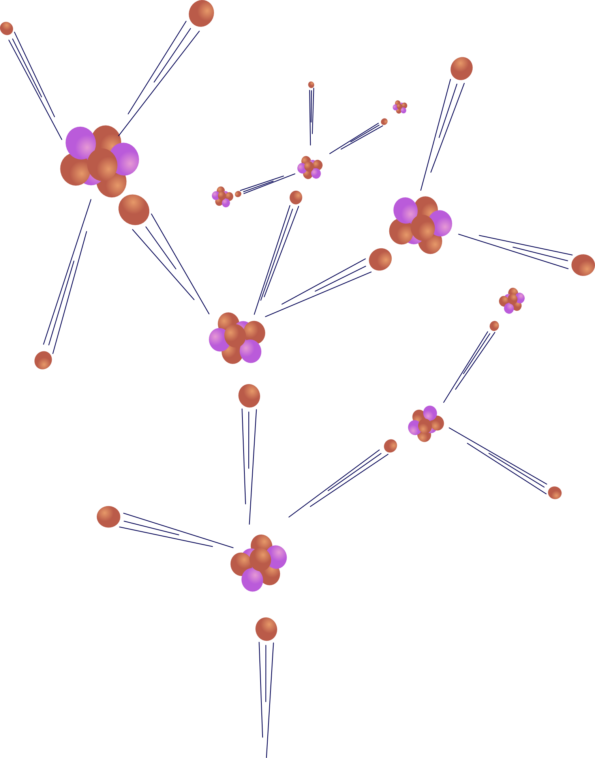“Doubt is not a pleasant condition, but certainty is an absurd one.”
—Voltaire
Truth is the ultimate victim of fear.
FDR never knew how prescient he was when he said, “there is nothing to fear but fear itself.”
The fear level in the world has risen to unprecedented heights. In order to cope with heightened anxieties, people either substitute fantasy for reality, cling more tightly to their faith, or distort the facts. It appears to me like a chain reaction: fear leads to fantasy that is then expressed in faith which creates its own convoluted “truth” or faux facts.

A chain reaction is a series of events in which each induces or influences the next. In physics, it is a process in which a neutron colliding with an atomic nucleus causes fission and the ejection of one or more neutrons that induce another nuclei to split. In chemistry, it is a series of rapidly occurring events, each of which precipitates the next. The application to politics is readily apparent.
What we have been witnessing over the past year is a political chain reaction in which fake news created demented fantasies that led to an unfounded faith in a fool as well as the rejection/ejection of any semblance of truth. Let’s explore the components of this reaction more closely.
Fear is an unpleasant emotion caused by the belief that someone or something is dangerous, likely to cause pain or is a threat.
Fear comes in many shapes, sizes, and intensities, e.g. terror, horror, alarm, panic, dread, consternation, or mild distress.
Fear can be a rational response to physical and emotional danger. Without fear we would be vulnerable to legitimate threats. Absent fear, we might not flee when possible or fight when necessary. In many far-from-life-or-death situations, however, we may crank up our hormones and cortisol levels and over-react to hyperbole instead of responding calmly to the actual situation at hand. Fear may lead us to fantasize about sending people to jail or killing beasts when there has been no crime and there are no beasts. Remember, as a kid, how dragons mysteriously manifested themselves under your bed when the lights went off.

Fantasies help us to create an imaginary universe in which villains are created from distorted narratives.
Most fantasies involve using magic or other supernatural powers as the main plot. Magical thinking is common in these illusory worlds in which knights appear, slay the dragons, and single-handedly solve all the problems. Fantasy is best classified as speculative fiction. In popular culture, fantasy is primarily of a medieval nature. Essentially, fantasy follows rules of its own making and typically takes place in a world that could never be.
In the 21st century, the fantasy genre has increased in popularity as evidenced by the huge successes of Harry Potter series and the Lord of the Rings trilogy. These films were the highest grossing film in cinematic history, just as the fantasy-based election of Trump was the grossest example of democratic vulnerability. The fact that over 60 million people have faith that Donald Trump will make America great is beyond comprehension. It was hard enough to imagine the popularity of fantasy football. I’m not sure how I’m going to get my head around fantasy-based foreign policy.
Faith is the complete trust or confidence in someone or something.
In religion, a strong belief in God or in the doctrines of a particular tradition is based on spiritual apprehension rather than proof. Faith can be the observance of an obligation, fidelity to a person or promise, or a belief. According to James Fowler, a professor of Theology and Human Development at Emory University, faith can be based on stories and rituals, conformance with social norms, belief in an authority system, personal needs and experiences, hope for transcendence, a negotiated settling, or a commitment to universal principles of compassion, love, and service to others. People with strong faith sometimes question the ability of reason to arrive at all truth.
Religions have different perspectives on what it means to be “faithful.” For example, the Bahai Faith is based on a deep personal understanding, conscious knowledge, and the practice of good deeds; in Buddhism, faith is described as a conviction that something “is,” a determination to accomplish goals, and a joy derived from conviction and accomplishment. While Buddhist practice requires a degree of trust, it does not imply blind faith. In Buddhism, faith is a belief in awakening, spirituality, and community. Faith is not always a bad thing.

Research indicates the appeal of faith and untestable beliefs. As Al Gore has brilliantly demonstrated, when the truth becomes inconvenient, humans tend to take flight from facts.
Even though it has become easier to test and establish facts, people still hold onto their biases and beliefs.
When people are confronted with facts that contradict their beliefs, they either dispute the validity of the facts or reframe the issue to make it untestable. In essence, they deny the relevance of facts.
Studies have also shown that when people’s beliefs are threatened they often retreat to a place where facts do not matter. When facts are fuzzy people tend to exaggerate closely held beliefs. Thus fake news not only exacerbates people’s fears, but also makes it easier to retreat into entrenched positions. In this light, it is easy to understand how the fake news/fuzzy facts strategies of Trump, Comey, and Putin were so effective at defeating an established policy wonk. Taking deceit to a whole new level, conservatives are now claiming the media consists primarily of fake news to further obfuscate the truth. It’s seduction, deception and trickery at its worst.
In his new book, The Undoing Project, Michael Lewis tells the story of how Daniel Kahneman (Nobel Prize winning author of Thinking, Fast and Slow) and Amos Tversky collaborated so brilliantly to produce profound insights on judgment, decision-making, and intuition. Essentially, what they found after 30 years of study was that:
1) people tend to be terrific at explaining and terrible at predicting; 2) we think our intuitions and beliefs are spot on, but they are often inaccurate; and 3) if you want to persuade someone to take a risk, simply frame it in terms of avoiding loss instead of securing gain.
Both books (The Undoing Project and Thinking Fast and Slow) are well worth reading.
Clearly, their research “explains” what happened in this election process: we were terrible at predicting the results, we thought our intuitions about voting behavior were fool-proof, and Trump framed his whole campaign on what people would lose if Hillary were elected.
Whenever I have an idea for a new post, I search the internet to see if there is anything published on the topic I have in mind. I’m embarrassed to say that my typical assumption is that my idea is entirely unique and no one could have possible come up with such a clever title for a book or post. For example, last year I came up with an idea for a post to be entitled “The Morality of Normality.” My fantasy was that this title was completely original. I had full faith and confidence that no one could have possibly imagined such a slick title. When I did the search, however, my fantasy and faith were destroyed. Someone had already written an article using that title. Ahh, I was so humbled and humiliated. My fear of not being singularly unique was confirmed by the facts.
For this post, I had a logical firing order in mind so I searched for “Fear, Fantasy, Faith, and Fact” not expecting, of course, for anything to pop up. Much to my surprise, I learned, once again, that I was not the only crafty person in the world. In this case, John Henderson published the book Fear, Faith, Fact, and Fantasy in 2003. Whew, not only did I have to deal with the reality that I did not have a unique idea, but also with the fact that he beat me to the punch by 13 years.
In both cases, the stories behind the title were significantly different. Henderson’s book discussed the shock of the entire world watching airplanes crash into the World Trade Center on 9/11 killing thousands of innocent women, men, children, Jews, Christians, Muslims, Buddhists, and Atheists—all in the name of God. The book challenges the reader to think and reason logically on even the existence of God—let alone his or her involvement in human affairs. It stresses the harm caused by religions and makes a plea to people to speak up when religion is used to express intolerance, hatred, and bigotry.
Clearly, the book still has relevance in the world today. But let me return to the main point of this post.
When fear leads to fantasies and faith-based beliefs, facts can be dismissed, denied, or distorted.
Extremists are fueling fears, feeding fantasies, and faking faith to get people in such a frenzy that facts don’t matter. In the end, truth is the ultimate victim of fear.
I admit to being afraid that we may experience a chain reaction resulting from a collision of cultures that ejects the truth and destroys the planet. Perhaps what we need is a reverse chain reaction that starts with a rigorous review of the facts—enabling us to bravely challenge our beliefs, deflate our fantasies, and calm our fears. The reverse chain reaction would result in an ejection of fear instead of facts.
I think Voltaire had it right. It’s time we create doubt in the certainty of our beliefs. Doubt may be unpleasant, but certainty is absurd.
Also published on Medium.
